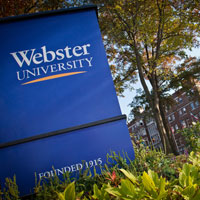Webster University Receives $400,000+ Grant to Create an Impact Center for Training Students for In-Demand Jobs
December 14, 2022
 Webster University received a grant for $428,062 from the Missouri Department of Higher
Education and Workforce Development to create the Webster University Impact Center
and provide experiential learning opportunities for students in underserved communities,
including rural areas, it was announced this week.
Webster University received a grant for $428,062 from the Missouri Department of Higher
Education and Workforce Development to create the Webster University Impact Center
and provide experiential learning opportunities for students in underserved communities,
including rural areas, it was announced this week.
The grant provides crucial support for three interconnected initiatives at Webster University, supporting efforts to meet unmet educational needs, both here in Missouri and beyond.
First, this award provides startup funding for an Impact Center. The Center will fill an educational gap by offering rural and underserved students training in emerging new technologies that are quickly being adopted by small and medium-sized businesses working to remain competitive in an increasingly technology-driven market.
Biology Professor Mary Lai Preuss in the College of Science and Health is overseeing the development of the Impact Center, with the primary focus of providing students with opportunities to build applied knowledge and practice skills needed for the workplace.
“In the first year, recruitment and support of rural students will be prioritized as they practice specific technology skills while completing their bachelor’s degree,” Preuss said. “Exposure to cutting-edge technologies is crucial for training our students for contemporary industry needs. We are truly excited to contribute to expanding the pool of skilled workers for today’s workforce.”
Second, funding will support a major investment in new technology in the School of Communications. “Video walls and virtual cinema systems will become ubiquitous in the industry over the next decade, opening a large number of jobs here in Missouri as well as on the coasts and in other media production centers,” said School of Communications Dean Eric Rothenbuhler. “The virtual cinema technology brings together skills and expertise that could only be found previously in the distinct industries—and degree programs—of game design, animation, film and video production, live event production, and audio video systems integration. Our program bridges the rapidly growing industry of applied communication technology with business, government, non-profit, and entertainment industries.”
Finally, this grant will accelerate the Webster Heartland Promise program to increase access to higher education for rural students. Statistics show that rural areas have the lowest college completion rates in the United States and limited access to pools of prospective employees who are qualified to fill STEM and technology positions. This directly impacts rural communities as they struggle to remain competitive in the modern economy.
“Webster University has long committed to meeting unmet needs for students and their communities, including those who may not be able to easily pursue a college degree. This grant will accelerate that capability for those in rural communities in particular,” said Webster University Chancellor Elizabeth (Beth) J. Stroble. “Through Webster’s innovative academic programs and our access to state-of-the-art technology, we will be able to offer technologically-advanced training in underserved areas.”
“Most underserved areas do not have access to the technology that is driving rapid changes in how companies do business in our ever-increasingly wired world,” said Webster University President Julian Z. Schuster. “Through the Impact Center, we will train students with the ground-breaking technology that is offered in our classrooms so that after graduation they can return to their communities with these advanced skills and incorporate them into their future careers.”
This was one of two grants Webster University received this week from the Missouri Department of Higher Education and Workforce Development. The second grant will fund the expansion of a virtual classroom project launched during the pandemic that will help teachers in the region develop and test skills to improve their virtual and in-classroom skills. The grants are funded through the American Rescue Plan Act (ARPA) and were recommended in Governor Parson's Fiscal Year 2023 budget proposal.
“We are thrilled that both projects were funded,” said Webster University Assistant Vice President of Research Eric Goedereis. “This sort of external validation of our ideas for these innovative initiatives really shows you how far we can go when we come together for a common goal. The real fruits of these efforts will be borne when our students find themselves well-prepared to compete in today’s knowledge and technologically-focused workforce.”
